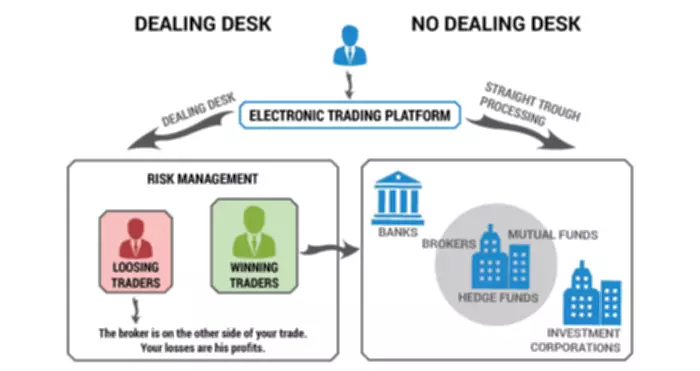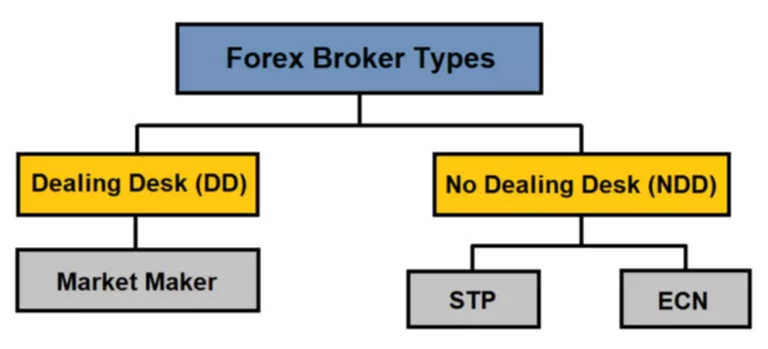Before starting your trading journey, it is crucial that you get acquainted with the different types of brokerage companies. This might seem to be an insignificant detail, but it influences your earnings a lot. Choosing the wrong option, you will just end up having significant losses with each trade, and that is a situation no trader wants to experience.
We shall cover the major forex broker types and provide some of their features. This should help you come up with an idea of the best option for your earnings.
What types of forex brokers are there?
If you take a look at the picture above, you can see a simple structure that classifies the types of brokerage companies. In general, there are two main options that are subdivided into several others:
- Dealing desks, referred to as DDs
- No dealing desks, also called NDDs
The former type has no subdivision, but the only thing that must be known is that DDs are often referred to as the “market makers”. The reason is the way they manage their business. A more detailed explanation will be provided in the next part of the article.
In the second case, two more options appear. These are:
- Straight through processing, referred to as STPs
- Electronic communication networks, also named as ECNs
We’ll briefly explain every option below.


Turnkey Brokerage Solution For Your Business
Get the most profitable fully licensed fx/crypto brokerage software or ready-to-operate business in 48 hours. Best-in-class web & mobile trading platforms, sales-driven CRM, full integration with MT4/5, and 150+ payment providers.
Dealing desks (DDs)
The earnings of DD brokers usually come from the losses of their traders, spreads, and several other options. People also call them “market makers” because these companies usually control the market prices. You can still trade however you want, but this does not affect the broker’s income.
Speaking of spreads, they are almost always variable. This is used by the companies to adapt the pricing and always gain profits. Therefore, it is nearly impossible for you to find a DD broker with fixed spreads. Whether it is good or not depends only on you.
An additional point that you must be aware of is that the market prices offered by DD brokers often differ from the real ones. However, do not worry, because of the constantly increasing competition for each client, the companies try to provide the most suitable terms for everyone.

Finally, we also want you to inform you that in case a broker cannot find a suitable order among its providers, it will take your order on itself. This means that it will be the opposite part of your trade and your loss will become the maximum profit for the company.
No dealing desks (NDDs)
NDDs brokers are the opposite of the previous option. They never stand as the second part of a trade. All they do is link your trade with someone else. Any other trader can trade with you.
Such a way of handling the trades impacts the earnings of the broker. To make at least some profits, the company should charge small commissions per each trade or provide higher spreads.
NDDs brokers are divided into two groups. We shall cover both types below.
Straight through processing (STP)
When you create an account with a company of this kind, be aware that all your trades are redirected towards a liquidity provider. You have no possibility to work with real traders.
It is a usual practice for such brokers to have many providers. This helps them to guarantee that each order is covered. It might seem to be an advantage, but it also brings some drawbacks like the difference in pricing from each liquidity provider. Therefore, you must be always attentive in order to get the highest profits.
We shall provide a short example for a better understanding of how this brokerage type works.
Supposing the company has 5 different options for your trade. The system will automatically sort them out from best to worst. You, however, will see this only the way the broker wants you to see it. If the real spread is 1 pip, you will get 3 pips. That is how STP brokers compensate for providing their services.
Although most Straight Through Processing companies provide variable spreads, there also are those who work with fixed ones. Finding these may be difficult, but maybe the terms might be a bit more suitable for you.
Electronic communication network (ECN)
If we speak of a real ECN, then all the members of it are able to work with the orders of each other. It is not necessary for the members of the network to be single traders. These can also be banks, retailers, and anyone else. The popularity of the platform decides everything.
Setting proper spreads in an ECN is very difficult, so the brokers usually charge a small commission per each trade. Be sure to read the terms and conditions before funding your account to be aware of all the potential pitfalls that might be encountered.
The bottom line
We have covered the 4 main types of forex brokers.
Each option comes with its own advantages and disadvantages, but it is recommended that you get acquainted with the detailed terms of every company you work with. This will help you find the most profitable option. Also, do not neglect the documentation. You can often find some interesting information there that might affect your trades.






